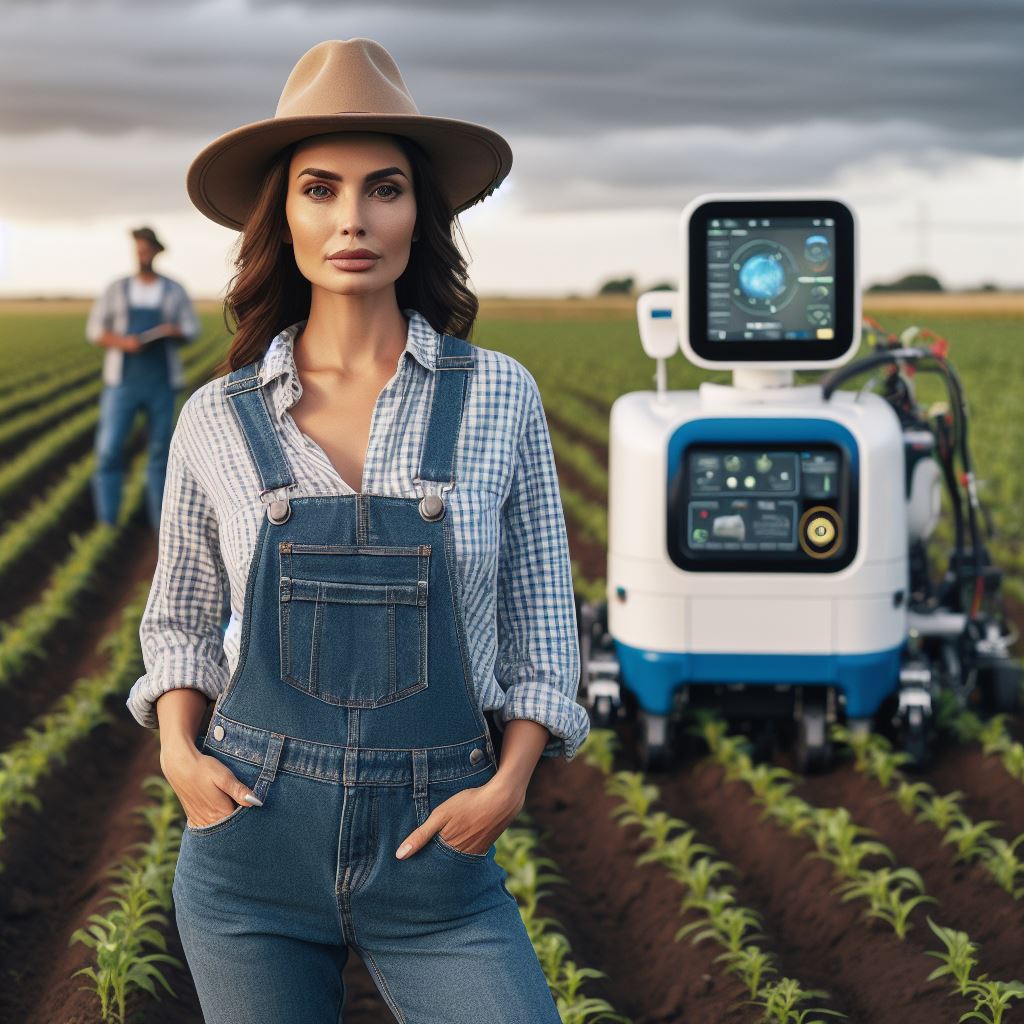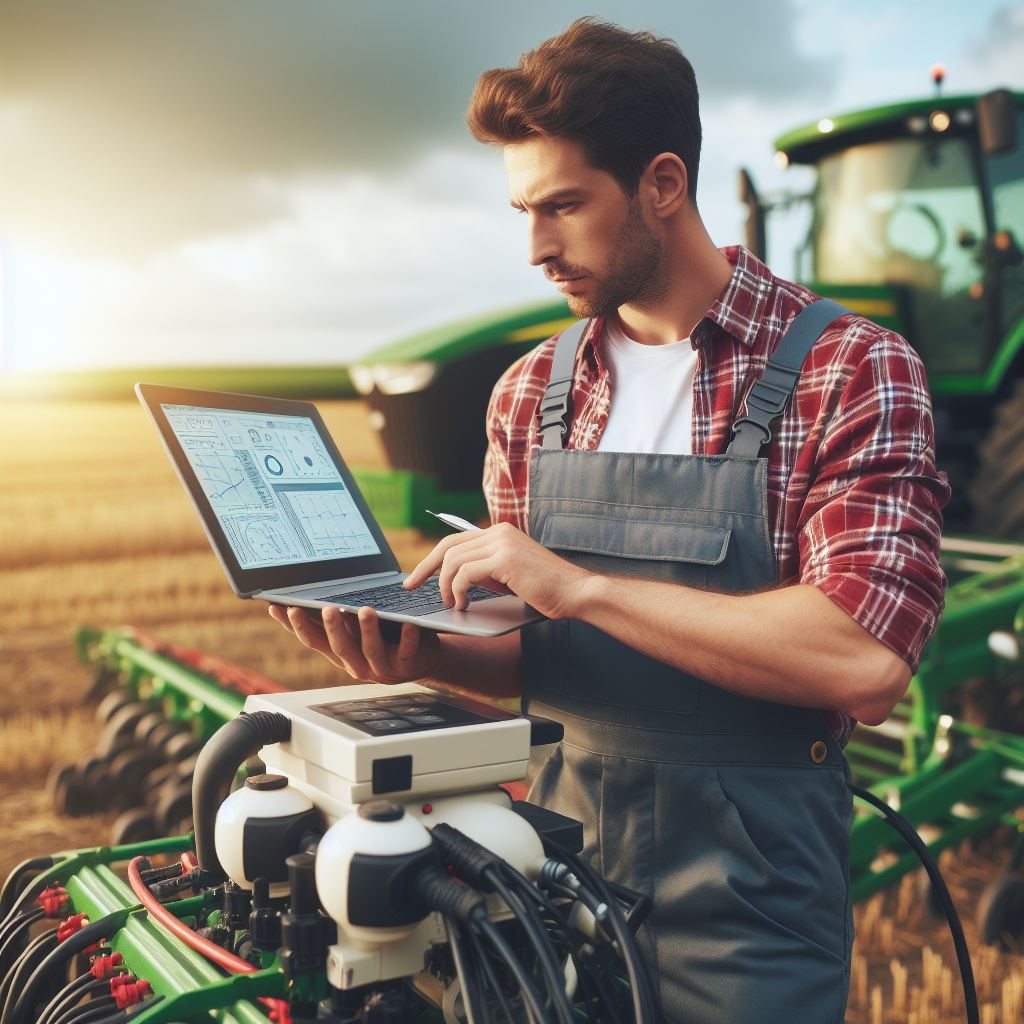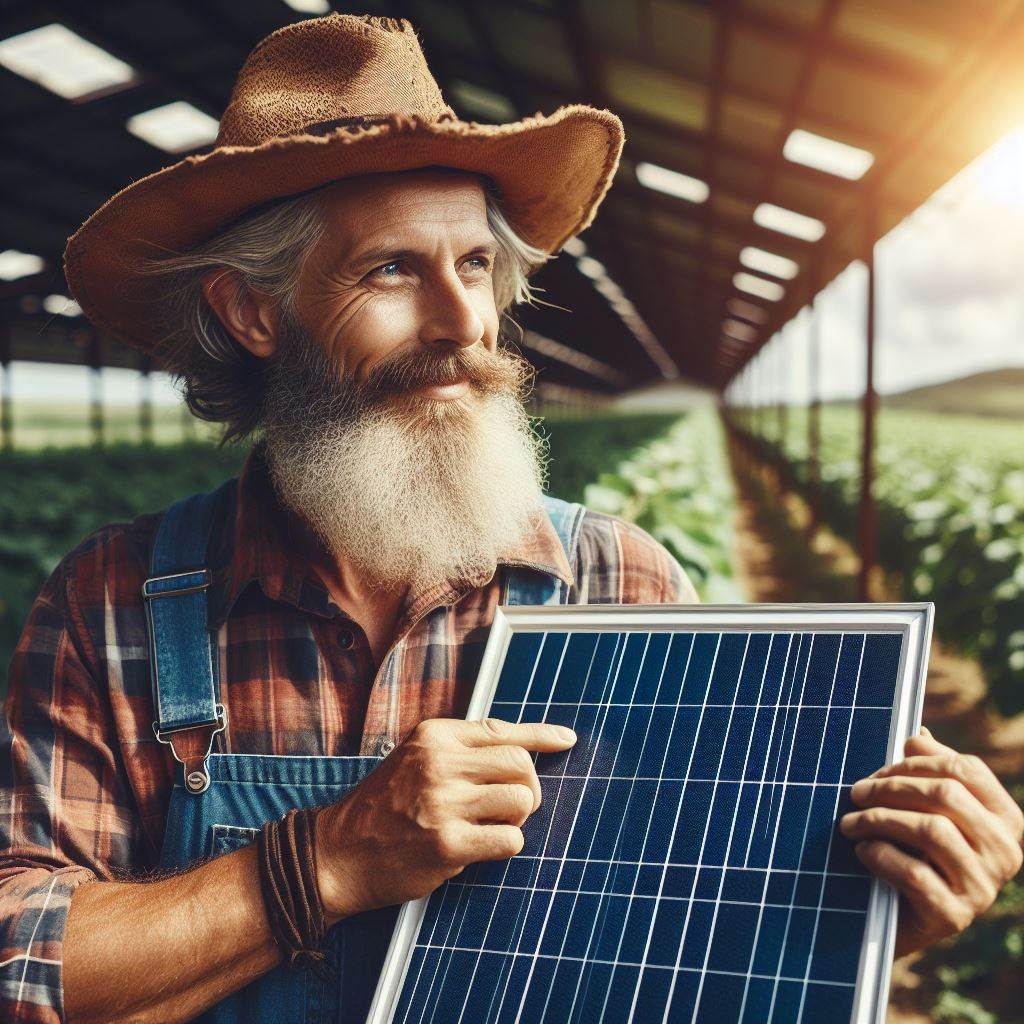Introduction
The concept of smart farming
Smart farming refers to the use of technology to enhance agricultural practices and increase efficiency.
It involves the integration of sensors, drones, and AI to monitor and manage crops and livestock.
The importance of agriculture tech in modern farming
Agriculture tech plays a crucial role in modern farming as it helps farmers improve productivity, reduce costs, and minimize environmental impact.
With the world’s population increasing, there is a growing need for sustainable and efficient farming methods.
Sensors placed in fields can collect data on soil moisture, temperature, and nutrient levels, allowing farmers to make informed decisions about irrigation and fertilization.
This data-driven approach maximizes crop yields and conserves water and resources.
Drones equipped with cameras and sensors can monitor crops from the air, providing valuable insights on crop health and identifying areas affected by pests or diseases.
Farmers can then take targeted actions, minimizing crop damage and reducing the need for chemical treatments.
AI and machine learning algorithms analyze large amounts of data, enabling predictive analytics that help farmers optimize planting schedules, predict pest outbreaks, and streamline supply chains.
This data-driven decision-making process ensures better resource utilization and higher yields.
Moreover, smart farming facilitates the implementation of precision agriculture techniques.
Farmers can use GPS technology and automated machinery to precisely apply fertilizers and pesticides, reducing waste and minimizing environmental pollution.
Basically, smart farming is revolutionizing agriculture by harnessing the power of technology.
It enables farmers to make data-driven decisions, optimize resource usage, and increase productivity while minimizing environmental impact.
As technology continues to advance, the potential for smart farming to transform the agricultural industry is immense.
Transform Your Agribusiness
Unlock your farm's potential with expert advice tailored to your needs. Get actionable steps that drive real results.
Get StartedBenefits of Smart Farming
Smart farming has revolutionized agriculture tech, bringing numerous benefits to farmers around the world.
Increased productivity and efficiency
One of the main advantages of smart farming is the increased productivity and efficiency it offers.
Through the use of advanced technologies such as Internet of Things (IoT), farmers can monitor their crops and livestock in real-time, allowing them to optimize their operations and achieve higher yields.
Reduction in resource wastage
In addition, smart farming helps in reducing resource wastage.
By using sensors and automation systems, farmers can accurately measure the needs of their crops, such as water, fertilizers, and pesticides.
s precise data allows them to apply the required resources in the right amount, minimizing waste and saving costs.
Improved crop quality and yield
Furthermore, smart farming leads to improved crop quality and yield.
With the help of sensors embedded in the fields, farmers can monitor and analyze various environmental factors such as temperature, humidity, and soil moisture.
This data enables them to adjust farming practices accordingly, ensuring optimal growing conditions and better-quality crops.
Precision farming and data-driven decisions
Precision farming is another significant benefit of smart farming.
By using GPS technology and specialized equipment, farmers can precisely map their fields and apply treatments only where needed.
This targeted approach reduces the use of pesticides and fertilizers, minimizing environmental impact and increasing sustainability.
Data-driven decisions are crucial in modern agriculture, and smart farming provides farmers with valuable insights.
Through the collection and analysis of data from various sources, such as weather patterns, soil conditions, and market trends, farmers can make informed decisions about planting schedules, crop varieties, and market strategies.
This knowledge empowers them to adapt to changing circumstances and maximize their profits.
Benefits of Smart farming
Overall sustainability of agriculture
Moreover, smart farming contributes to the overall sustainability of agriculture.
By optimizing resource usage, reducing waste, and adopting eco-friendly practices, farmers can minimize their environmental footprint.
This not only benefits the planet but also improves the reputation of the agricultural industry as a whole.
Economic advantages for farmers
The adoption of smart farming also leads to economic advantages for farmers.
By utilizing technology and automation, farmers can streamline their operations, reduce labor costs, and increase their overall profitability.
This helps in attracting younger generations to the agricultural sector, ensuring its sustainability for the future.
Enhances food safety and traceability
Additionally, smart farming enhances food safety and traceability.
By implementing sensors and tracking systems throughout the supply chain, farmers can easily trace the origin of their produce.
This transparency builds consumer trust, as they have access to detailed information about the production process, ensuring food safety standards are met.
Showcase Your Farming Business
Publish your professional farming services profile on our blog for a one-time fee of $200 and reach a dedicated audience of farmers and agribusiness owners.
Publish Your ProfileBetter pest and disease management
Furthermore, smart farming facilitates better pest and disease management.
With the help of remote monitoring and early detection systems, farmers can promptly identify and respond to potential threats.
This proactive approach reduces crop losses and the need for harmful chemical interventions.
Generally, smart farming brings a range of benefits to the agricultural industry.
From increased productivity and efficiency to improved crop quality and precision farming, this technological revolution holds great promise for the future of sustainable and profitable agriculture.
By embracing smart farming practices, farmers can not only optimize their operations but also contribute to environmental conservation and meet the growing demand for safe and high-quality food.
Read: Smart Farming: IoT in Crop Management
Key Technologies in Smart Farming
Smart farming, also known as precision agriculture, is revolutionizing the agricultural industry by integrating technology and data analytics to optimize farming practices.
This section will discuss the key technologies that enable smart farming to significantly improve productivity, reduce costs, and minimize environmental impact.
Internet of Things (IoT) and Sensor Networks
The IoT technology allows for the connectivity of various devices and sensors on the farm, creating a network that collects real-time data.
Sensors can monitor soil moisture, temperature, humidity, and even the presence of pests.
Farmers can access this data through their smartphones or computers.
This information helps them make informed decisions on irrigation, fertilizers, and pest control, ensuring optimal conditions for crop growth.
Automation and Robotics
Automation and robotics have become essential tools in smart farming, streamlining labor-intensive tasks.
Automated systems can sow seeds, apply fertilizers and pesticides, harvest crops, and even milk cows.
Robots equipped with computer vision and machine learning capabilities can identify and remove weeds, minimizing the use of herbicides.
These technologies reduce human labor, increase efficiency, and improve overall farm management.
Data Analytics and Artificial Intelligence
Data analytics and artificial intelligence (AI) play a crucial role in transforming raw farm data into actionable insights.
Farmers can analyze historical data and gain valuable insights into crop growth patterns, yield predictions, and optimal resource allocation.
AI algorithms can detect diseases in crops, identify nutrient deficiencies, and prescribe precise solutions.
This enables farmers to make data-driven decisions, optimize resource usage, and improve crop yields.
Drones and Remote Monitoring Systems
Drones equipped with cameras and sensors provide farmers with aerial imagery of their fields, enabling them to monitor crop health, detect anomalies, and identify areas of concern.
This real-time monitoring allows for timely intervention, reducing crop losses and optimizing resource allocation.
Furthermore, drones equipped with GPS and spraying systems can precisely apply fertilizers and pesticides, minimizing waste and environmental impact.
Essentially, the integration of key technologies in smart farming has revolutionized the agricultural industry.
With IoT and sensor networks, automation and robotics, data analytics and AI, and drones, farmers can make informed decisions, optimize resource usage, and increase crop yields.
This technological advancement not only benefits farmers by reducing manual labor and costs but also contributes to sustainable farming practices by minimizing environmental impact.
Smart farming enables us to meet the growing food demand while ensuring efficient resource utilization and preserving the environment.
Read: Smart Farming: AI’s Growing Impact
Applications of Smart Farming
Smart farming, also known as precision agriculture, is transforming the traditional agricultural practices through the integration of advanced technology.
With the help of Internet of Things (IoT) and artificial intelligence, smart farming is paving the way for sustainable and efficient agricultural production.
This section explores the various applications of smart farming that are revolutionizing the agriculture industry.
Smart irrigation systems
- These systems use sensors and weather data to optimize water usage in farms, reducing water wastage.
- Farmers can remotely control and monitor irrigation systems, ensuring crops receive the right amount of water.
- By avoiding over or under-watering, smart irrigation systems improve crop yield and save water resources.
Crop monitoring and management
- Smart farming enables real-time monitoring of crop growth using drones, satellite imagery, and sensors.
- Through data analysis, farmers can identify crop health issues, nutrient deficiencies, and pest infestations.
- By providing timely interventions, smart farming helps farmers take proactive measures to safeguard their crops.
Livestock monitoring and health
- Smart technology allows farmers to track the health, behavior, and location of livestock.
- Wearable devices, such as smart collars, monitor vital signs of animals and detect early signs of diseases.
- This real-time monitoring enables prompt veterinary care, leading to improved animal welfare and productivity.
Automated machinery and equipment
- Smart farming utilizes autonomous machinery and robotics to perform labor-intensive tasks.
- Robots can be programmed to perform activities like harvesting, planting, and weed control with precision.
- Automated machinery reduces the need for manual labor, leading to cost savings and increased efficiency.
Benefits of Smart Farming Application
These applications of smart farming bring several benefits to the agriculture industry.
Contribute to sustainable farming practices
By optimizing water usage and minimizing wastage, smart irrigation systems contribute to sustainable farming practices.
Monitoring and managing crops help farmers make informed decisions, resulting in higher yields and healthier plants. Livestock monitoring ensures animal welfare and maximizes productivity.
Enhancing productivity and reducing labor costs
Additionally, the use of automated machinery and equipment streamlines operations, enhancing productivity and reducing labor costs.
With precise and timely interventions, smart farming minimizes the use of pesticides and fertilizers, promoting environmentally friendly practices.
Provide valuable insights for farmers
Moreover, smart farming leverages real-time data and analytics to provide valuable insights for farmers.
These insights enable data-driven decision-making, facilitating better resource allocation and management.
By adopting smart farming techniques, farmers can optimize yield, reduce operational costs, and increase profitability.
Showcase Your Farming Business
Publish your professional farming services profile on our blog for a one-time fee of $200 and reach a dedicated audience of farmers and agribusiness owners.
Publish Your ProfileIt is important to note that the implementation of smart farming requires access to reliable internet connectivity, as well as the knowledge to operate and interpret the data provided by these technologies.
Governments and stakeholders need to provide support and resources to ensure widespread adoption of smart farming practices.
In short, smart farming presents a promising future for agriculture.
The various applications of smart farming, such as smart irrigation systems, crop monitoring, livestock management, and automated machinery, are revolutionizing traditional farming practices.
By harnessing the power of advanced technology, smart farming brings efficiency, sustainability, and increased productivity to the agriculture industry.
Read: Smart Farming: Top 5 Agri-Tech Innovations in 2024

Challenges in Adopting Smart Farming
Smart farming, with its innovative technologies and automation, is revolutionizing the agricultural industry.
However, like any new technology, there are challenges to overcome in its adoption.
Initial investment and costs
One of the main challenges in adopting smart farming is the initial investment and costs.
Farmers need to invest in sensors, drones, and other equipment, which can be expensive.
Technical know-how and training
Another challenge is the requirement for technical know-how and training.
Farmers need to learn how to operate and maintain the smart farming technology effectively.
Connectivity and infrastructure limitations
Connectivity and infrastructure limitations also pose a significant challenge.
In remote areas, where agriculture is prevalent, internet access may be limited, hampering the efficiency of smart farming systems.
Data privacy and security concerns
Data privacy and security concerns are also important challenges.
With the collection of vast amounts of data, farmers need assurance that their data will be protected from unauthorized access and use.
Despite these challenges, the adoption of smart farming brings several benefits to the agricultural industry. It enhances productivity, reduces water and fertilizer usage, and improves crop quality.
How to overcome the challenges
So, how can these challenges be overcome? Here are some possible solutions:
- Government support: Governments can provide subsidies or grants to farmers to reduce the initial investment costs associated with smart farming equipment.
- Training programs: Organizations and agricultural institutions can offer training programs to educate farmers about smart farming technologies and their operation.
- Improved connectivity: Investments in rural infrastructure, such as expanding internet access, can help overcome connectivity limitations in remote areas.
- Data protection measures: Governments and industry stakeholders should develop regulations and guidelines to ensure data privacy and security in smart farming.
Collaboration between different stakeholders
Furthermore, collaboration between different stakeholders is crucial for the successful adoption of smart farming.
Farmers, government agencies, technology providers, and researchers need to work together to address challenges and develop sustainable solutions.
Continuous research and development
Another important aspect is the need for continuous research and development in smart farming technology.
This will lead to the creation of more affordable and user-friendly tools, making them more accessible to farmers.
Education and awareness campaigns
Education and awareness campaigns can also play a significant role in overcoming challenges.
By informing and educating farmers about the benefits and potential of smart farming, they can make more informed decisions regarding its adoption.
While there are challenges in adopting smart farming, they can be overcome with the right strategies.
Government support, training programs, improved connectivity, and data protection measures are key to successful implementation.
By addressing these challenges and actively promoting the benefits of smart farming, we can revolutionize agriculture and ensure a sustainable future for the industry.
Read: Hydroponics: Water-Smart Farming Future
Success Stories in Smart Farming
Smart farming, the application of advanced technologies in agriculture, has revolutionized traditional farming methods.
Through the use of Internet of Things (IoT), Artificial Intelligence (AI), and other emerging technologies, farmers around the world have experienced significant benefits in terms of productivity and profitability.
In this section, we will explore some inspiring success stories that showcase the advantages of smart farming.
Case studies of farmers benefitting from smart farming
- John Smith, a corn farmer in Iowa, implemented IoT sensors in his field to monitor soil moisture levels in real-time. As a result, he reduced water usage by 30% and achieved higher crop yields.
- Maria Garcia, an organic fruit grower in Spain, utilized AI-powered drones equipped with image recognition technology to identify diseased plants. This enabled her to take targeted actions, reducing crop losses by 40%.
- Robert Johnson, a cattle rancher in Australia, adopted smart collars for his livestock to monitor their health and behavior. By tracking vital signs, he could detect early signs of illness and effectively prevent the spread of diseases.
Examples of improved productivity and profitability
- Smart farming technologies have enabled farmers to automate routine tasks, such as watering, fertilizing, and weed control. This has saved them time and labor costs, leading to improved productivity.
- Remote monitoring systems, combined with data analytics, have empowered farmers to make informed decisions regarding crop management, optimizing resource allocation and maximizing yields.
- The integration of precision farming techniques, including GPS mapping and variable rate technology, has resulted in precise application of inputs, minimizing wastage and reducing operational costs.
Real-life experiences highlighting the advantages
Tom Wilson, a small-scale vegetable farmer in California, shares his experience with smart farming technology:
“Before adopting smart farming, I struggled with unpredictable weather conditions and pest infestations. However, after implementing connected weather stations and automated pest traps, I was able to receive real-time alerts and take immediate preventive measures. This significantly reduced crop losses and increased my overall profitability.”
Sarah Thompson, an agricultural consultant, emphasizes the long-term benefits of smart farming:
“I have witnessed the transformation of numerous farms through the adoption of smart farming technologies. Not only have they achieved higher yields, but it has also improved the sustainability and environmental impact of their operations. Smart farming is undoubtedly the future of agriculture.”
In general, smart farming has brought about remarkable success stories in the agricultural sector.
From increased productivity and profitability to enhanced sustainability and resource management, farmers have reaped the rewards of embracing technology.
As the world faces growing food demand and environmental challenges, smart farming offers a promising solution for a more efficient and sustainable agriculture industry.
Explore Further: Gene Editing: Boosting Crop Resilience
Future of Smart Farming
Smart farming has been revolutionizing the agricultural industry, integrating emerging technologies to enhance productivity, efficiency, and sustainability.
Showcase Your Farming Business
Publish your professional farming services profile on our blog for a one-time fee of $200 and reach a dedicated audience of farmers and agribusiness owners.
Publish Your ProfileThis technology-driven approach has the potential to greatly impact food security and promote sustainable farming practices. Let’s explore the predictions and trends that the future of smart farming holds.
Internet of Things (IoT) and Sensor Technologies
The integration of IoT and sensor technologies allows farmers to monitor and control various parameters like temperature, humidity, soil moisture, and nutrient levels remotely.
These real-time insights enable timely decisions and optimize resource allocation.
Precision Agriculture
Precision technologies such as GPS, drones, and remote sensing enable farmers to gather detailed information about their crops’ health and growth patterns.
This data-driven approach helps optimize the use of fertilizers, pesticides, and water, improving overall crop quality and yield.
Artificial Intelligence (AI) and Machine Learning
AI and machine learning algorithms analyze vast amounts of data collected from sensors and autonomous machines.
This analysis helps in predicting crop diseases, optimizing irrigation schedules, and even detecting upcoming weather patterns for better planning.
Robotics and Automation
Smart farming employs robots and automated machinery to perform labor-intensive tasks such as seeding, weeding, and harvesting.
This reduces the dependency on human labor, saves time, and minimizes crop damage, ensuring greater productivity and efficiency.
Blockchain Technology
The use of blockchain technology in smart farming enhances transparency and traceability.
It enables farmers to record and share real-time data regarding crop origin, pest control measures, and the use of fertilizers, ensuring consumers’ confidence in the quality and sustainability of agricultural products.
Vertical and Indoor Farming
Smart farming encourages the adoption of vertical and indoor farming methods.
These innovative approaches enable the cultivation of crops in controlled environments, utilizing space more efficiently, reducing water consumption, and minimizing the reliance on traditional farming methods.
Adoption of Biotechnology and Genetic Engineering
Biotechnology and genetic engineering play a crucial role in the future of smart farming.
Genetically modified crops are being developed to withstand harsh environmental conditions, pests, and diseases, ensuring higher yields and reducing the need for chemical interventions.
Data Analytics and Predictive Modeling
The collection and analysis of vast amounts of data generated by smart farming systems allow farmers to make data-driven decisions.
Predictive modeling helps anticipate crop diseases, optimize resource management, and fine-tune farming practices for maximum yield and sustainability.
Potential in Addressing Key Challenges
The integration of smart farming with emerging technologies holds enormous potential in addressing key challenges faced by the agricultural industry.
Food Security
Smart farming helps optimize crop production, reduce wastage, and improve the efficiency of the supply chain.
By enhancing productivity and promoting sustainable farming practices, it contributes to global food security.
Sustainability
Efficient resource utilization, reduced water consumption, minimized chemical usage, and controlled environmental conditions make smart farming a sustainable approach.
It supports the conservation of natural resources and promotes ecological balance.
In a nutshell, the future of smart farming is bright and promising.
The integration of emerging technologies, IoT, AI, robotics, and biotechnology will continue to reshape the agricultural landscape.
By embracing these advancements, farmers can ensure greater food security, sustainability, and profitability.
Smart farming is indeed revolutionizing agriculture tech, paving the way for a more efficient and sustainable future.
Gain More Insights: Biochar: Revolutionizing Soil Management
Conclusion
The benefits and potential of smart farming are immense.
By leveraging cutting-edge technology and data-driven solutions, farmers can enhance productivity, reduce costs, and minimize environmental impact.
Embracing agriculture tech is crucial for achieving sustainable agriculture that can meet the increasing global food demand while preserving our natural resources.
Smart farming enables efficient resource management and better decision-making for optimal crop growth.
Therefore, it is essential for farmers to explore and adopt smart farming practices.
By integrating IoT devices, artificial intelligence, and advanced analytics, they can revolutionize their farming methods and improve overall profitability.
It is time for farmers to actively embrace the transformative power of smart farming.
This means investing in technology, acquiring relevant skills, and collaborating with experts in the field.
Together, we can revolutionize agriculture and ensure food security for future generations.




